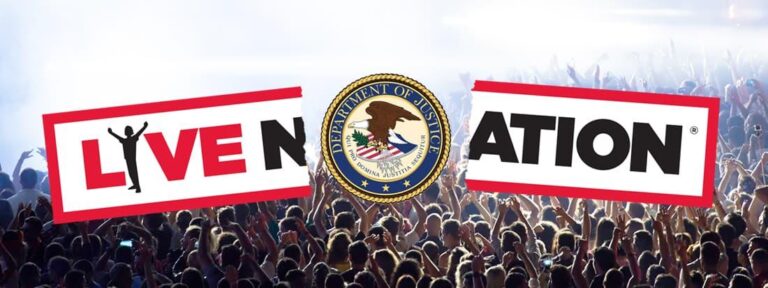A federal judge has indicated that Live Nation Entertainment, the world’s largest concert promoter, may face a trial in 2026 over allegations of antitrust violations in the United States. The case, brought by the U.S. Department of Justice, accuses Live Nation of engaging in anti-competitive practices that could undermine fair competition in the live entertainment industry. This decision marks a significant development in the ongoing legal battle, with potential implications for the concert business and ticketing markets nationwide.
Live Nation Antitrust Trial Scheduled for 2026 Highlights Regulatory Scrutiny
A federal judge has set the stage for a potential trial against Live Nation Entertainment in 2026, signaling heightened regulatory scrutiny over the concert promotion giant’s business practices. The case centers on allegations that Live Nation, which dominates both ticket sales and event promotion, may have engaged in anticompetitive behavior that stifles competition and limits consumer choices. Industry experts note that the lawsuit could reshape how large-scale live entertainment companies operate in the United States.
Key issues under examination include:
- Exclusive venue deals that may prevent rival promoters from accessing key markets.
- Ticketing platform control,notably concerns over inflated fees and restricted resale options.
- Market consolidation effects that raise barriers for emerging players in the live events space.
The outcome of this case has the potential to set critically important precedents for regulatory oversight in the entertainment industry, prompting calls for greater transparency and fairness in ticket distribution and event promotion.
| Aspect | Allegation | Potential Impact |
|---|---|---|
| Venue Contracts | Exclusive long-term agreements | Limits competition |
| Ticketing Fees | High service charges | Consumer costs rise |
| Market Control | Industry dominance | Barriers for new promoters |
Impact of Live Nation Case on US Concert Promotion and Ticketing Market
The anticipation of a potential 2026 trial has sent ripples through the US concert promotion and ticketing landscape. The case could fundamentally challenge Live Nation’s dominant market position, which has long been under scrutiny for its vertical integration of concert promotion, venue operation, and ticket sales. Industry experts suggest that if Live Nation is found to have violated antitrust laws, it may prompt significant regulatory reforms aimed at fostering competition and curbing monopolistic practices.
Among potential outcomes, stakeholders are closely watching for changes that could affect:
- Ticket pricing transparency — Greater oversight might lead to clearer pricing structures and reduced hidden fees.
- Venue access regulation — Smaller promoters could gain fairer opportunities to book popular venues.
- Consumer choice enhancement — With enhanced competition, fans might benefit from more diverse ticket purchasing platforms.
| Impact Area | Potential Change | Expected Benefit |
|---|---|---|
| Ticket Distribution | Breakup of exclusive contracts | More platforms selling tickets |
| Promoter Competition | Increased market access | Diverse concert options |
| Venue Operations | Stricter regulatory oversight | Improved fairness for artists |
Legal Experts Discuss Potential Outcomes and Industry Consequences
Legal experts emphasize that the pending trial could reshape the competitive landscape of the live entertainment industry. The case centers on allegations that Live Nation engaged in anticompetitive practices, potentially violating U.S. antitrust laws by monopolizing ticket sales and venue promotion. If the court finds Live Nation liable, it could impose stringent remedies, including divestitures or enforced changes in business operations, impacting both the company’s market dominance and strategic partnerships.
Industry professionals are closely monitoring the litigation’s repercussions, which could extend beyond Live Nation itself. Possible consequences include:
- Increased regulatory scrutiny over major players in event promotion and ticketing
- Heightened transparency demands for pricing and contractual agreements
- Potential market entry for new competitors
- Shift in artist and venue negotiations driven by altered power dynamics
| Potential Outcome | Industry Impact |
|---|---|
| Divestitures | Reduced market concentration |
| Operational Restrictions | Limits on exclusive contracts |
| Financial Penalties | Resource reallocation for compliance |
| Market Opportunities | New entrants encouraged |
Strategies for Competitors and Consumers in a Changing Entertainment Landscape
As the entertainment industry grapples with increasing consolidation,competitors and consumers alike are recalibrating their approaches to navigate an evolving marketplace. For competitors, diversification of offerings and strategic partnerships have become crucial tools to contend with dominant players potentially engaging in restrictive practices. Smaller promoters and venues are increasingly leveraging digital platforms to enhance visibility and audience reach, creating niche communities centered around unique live experiences that larger conglomerates may overlook.
Meanwhile,consumers are adapting by shifting consumption habits and demanding greater transparency and fair pricing. Innovations such as dynamic ticket pricing and blockchain-based resale markets aim to increase fairness and reduce fraud, reshaping how fans access live events. Below is a brief overview of emerging strategies shaping the landscape:
- Competitors: Focus on local market penetration, exclusive artist partnerships, and technological innovations in ticketing.
- Consumers: Embrace secondary markets, seek VIP or personalized experiences, and champion advocacy for regulatory oversight.
| Stakeholder | Strategy | Expected Outcome |
|---|---|---|
| Competitors | Community-focused events | Enhanced loyalty and niche market control |
| Consumers | Utilization of blockchain ticketing | Greater security and fair pricing |
In Summary
As the legal proceedings move forward, all eyes will remain on Live Nation and the broader entertainment industry, which could face significant changes depending on the outcome of this high-profile antitrust case. With the trial potentially set for 2026, stakeholders and observers alike will be closely monitoring developments that could reshape competitive dynamics within the live events market. Further updates will be reported as the case progresses.




